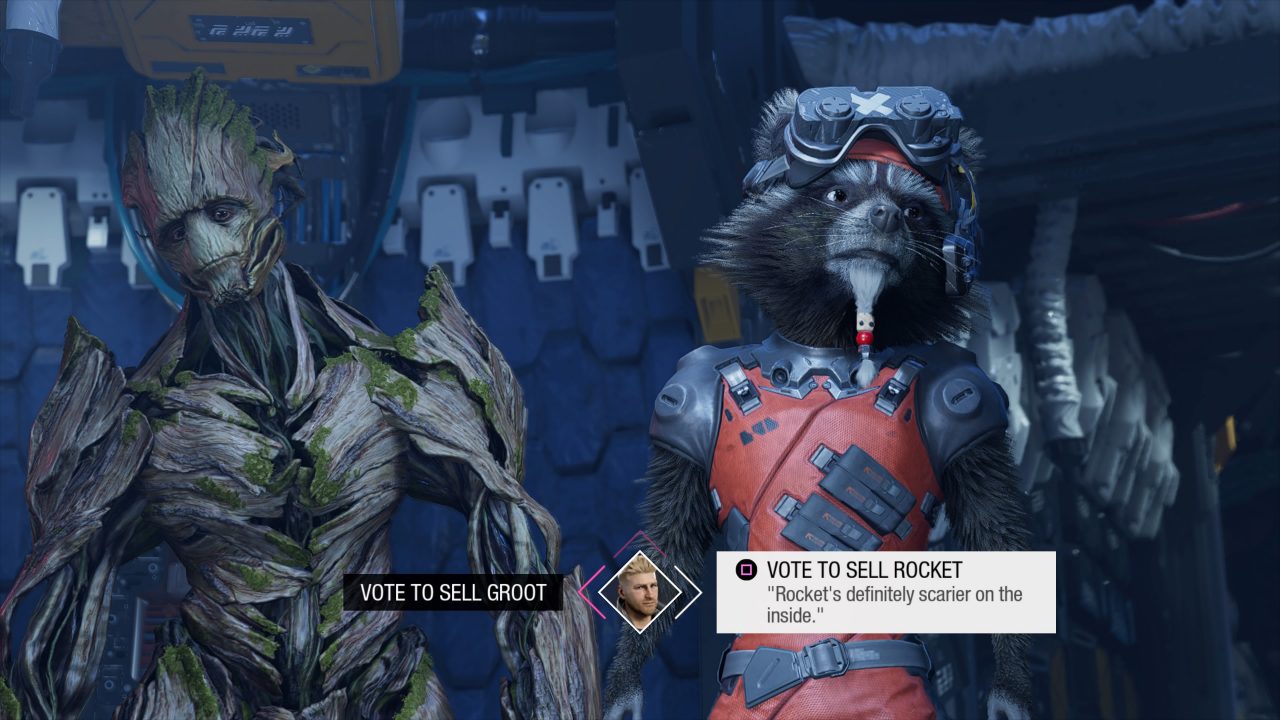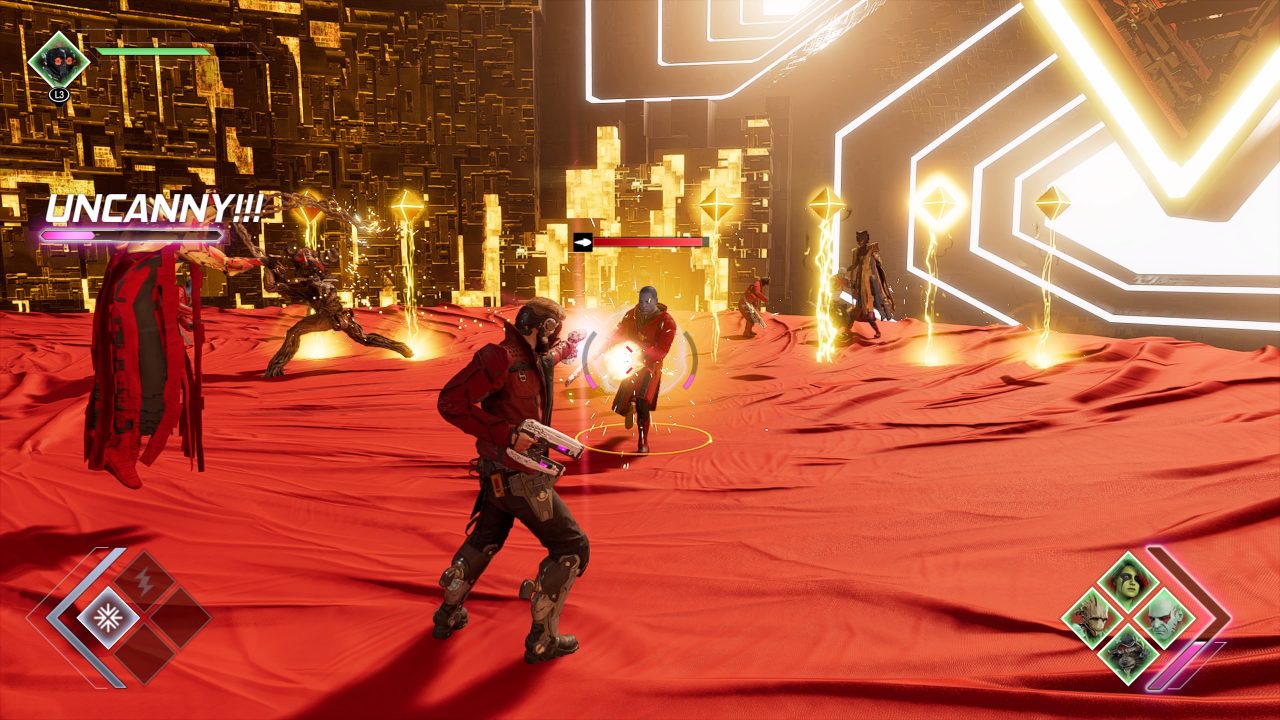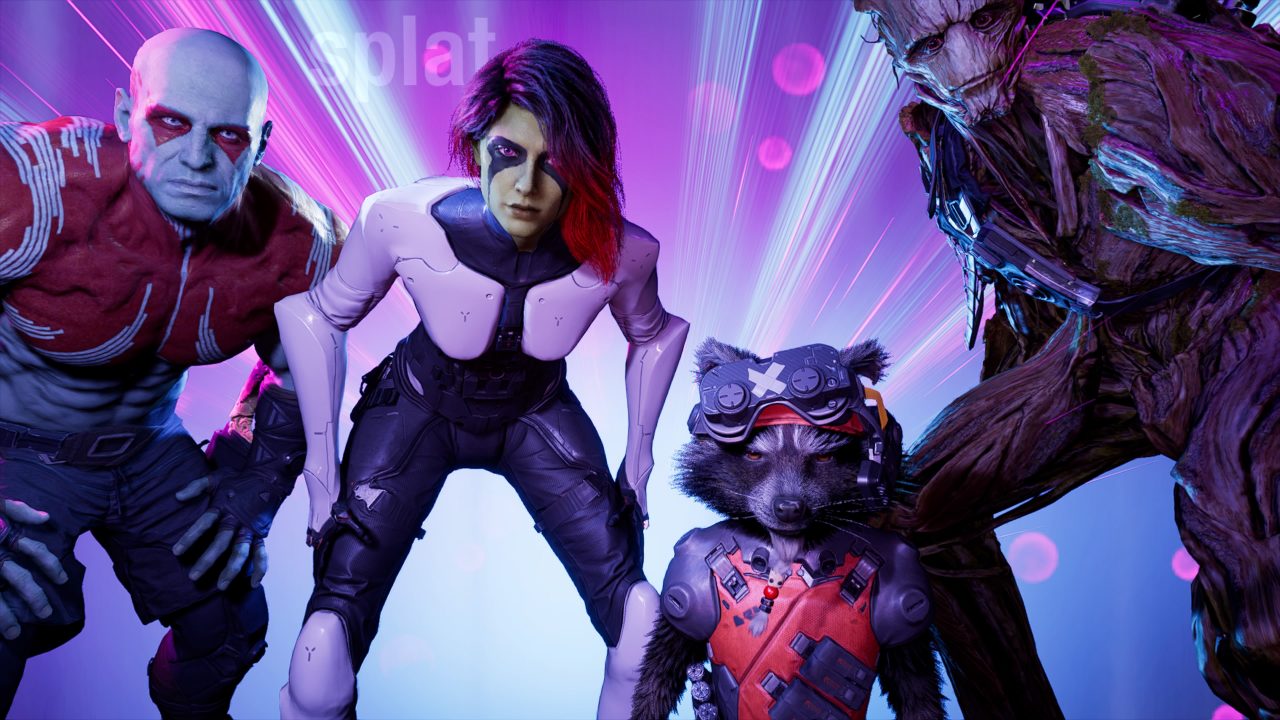A long, long time ago… whoops, wrong Disney-owned space opera franchise. It’s easy to be a little skeptical about Square Enix and Eidos-Montréal dropping another Marvel game after the unfulfilled promises of Marvel’s Avengers. In the Marvel Cinematic Universe, the Guardians of the Galaxy movies are known for bringing something a little different from their glossier siblings, such as a vintage aesthetic and irreverent humor. Can Marvel’s Guardians of the Galaxy rejuvenate the studios’ foray into the superhero genre? If you’re a fan of the franchise, then good news, they have brought that bunch of A-holes you’re looking for!
As you’ve probably guessed, Marvel’s Guardians of the Galaxy is an action-adventure game that follows the exploits of the team you’ve come to know and love: Star-Lord, Gamora, Drax, Rocket, Groot, and a few others dug up from deep in Marvel cosmic lore. If there’s anything the Guardians excel at, it’s finding their way into trouble and then subsequently needing to find their way out of said trouble. You take on the role of Peter Quill, who fashions himself as Star-Lord, the supposed leader of this team of fledgling space pirates. The game draws from both the movies (for the characters) and the comics (for the state of the universe), but the story’s all-new. The result is another gallivanting space opera romp that threatens to blow away any previous iterations of this team’s misadventures.
Guardians of the Galaxy, as these stories always are, is an exciting party upfront but with a soft and gooey center. This game thankfully never stops screwing around, tossing you into hilariously bizarre situations, but it also transitions into moments that cut into your emotional core. At the heart of these stories is finding comfort and support in one’s found family in a cold universe that enacts its cruelty on people, often through characters’ previous familial relationships. This interpretation digs much deeper than previous Guardians stories have, diving into the depths of grief and the sometimes harmful ways we cope with loss. If you ever thought these characters were too ridiculous and weird to get emotionally attached to, this game brings out their humanity in new ways (even Groot). If you’re unsure about being stuck playing as Star-Lord, this version of the character is more rounded and likable than others. And, of course, the Guardians must put their friendship to use to save a galaxy so constantly in need of saving. From your initial quest to capture a space monster to complete a job all the way to the finale, it’s an intergalactic roller coaster ride in every sense. The narrative easily ranks as not only an amazing video game story but also among Marvel’s all-time greatest tales.
And this story is partially up to you. You’re planted firmly in Star-Lord’s jet boots, and you’re often able to weigh in on ensuing conversations or events as they happen, and there are a flark-ton of these. The choices you make often have effects that extend to combat in different ways. More substantially, your decisions have a massive impact on directing the story’s path, and it’s always fun to see how things you’ve said and done affect you later. This is Eidos-Montréal, after all, and though Guardians of the Galaxy is not exactly Deus Ex, it’s still impressive how naturally the consequences of your actions weave into the story. The ending is set in stone, and there’s no altering that. But though all roads lead to the same finish, there are a few different paths to getting there. After a single playthrough, there were still some blank spots in my codex that I was eager to go back and fill in. And Guardians of the Galaxy carves out its own path from other player-choice-driven engines in how responsive it is to your actions, as well as your words at times. I shouldn’t say The Stanley Parable, but it’s lightly along those lines. Eidos-Montréal makes it clear that while this is Peter Quill’s story, it’s your story, too.

Square Enix has already published a Marvel game, and Guardians of the Galaxy’s structure resembles it to a degree. You get a few free moments to check in with the folks around your ship, the Milano, and jam to some ’80s tunes, but each chapter is otherwise extremely linear. With an emphasis on choosing how to interact with other characters, it’s like the best parts of Marvel’s Avengers mixed with a Telltale game (they did a Guardians game, too!). Knowhere, which resembles Final Fantasy VII Remake‘s version of Wall Market, is one of the more open areas, giving you a little more freedom to explore and interact with a seedy, Vegas-ish environment. But for the most part, any divergent paths mostly lead to purely cosmetic bonus items, like costumes or other collectibles.
In true Guardians of the Galaxy fashion, combat is pure chaos, as you direct teammates’ special attacks while trying not to die yourself. The system could use some refining, and it’s probably trying to do too much, but it’s so frantic that it always keeps you engaged. Bullets and bodies fill the air as you perform one explosive attack after another. Directing teammate attacks is done simply and intuitively with just a few button presses. But there is some wonkiness here. When you call in a teammate to attack, they don’t run over to the enemy you direct them at. Instead, they just appear next to the enemy to perform their attack, even though none of these characters can teleport like Nightcrawler, busting your immersion and killing off any semblance of tactical substance along with the enemy.
Star-Lord has a plethora of abilities of his own, too, some of which you can pick up through a simple crafting system using Rocket’s workbench. Handling Star-Lord in battle feels like a mash-up of several standard RPG classes. Though he primarily attacks with his guns and utilizes his agility via his jet boots like a rogue, he also has melee attacks that give him the edge of a fighter. He also puts on a mage’s hat with elemental attacks, the closest thing Peter has to actual superpowers (sorcery?), each of which behaves differently beyond corresponding to enemies’ weaknesses. For instance, ice freezes enemies and gives you a chance to shatter them with a subsequent attack. With Star-Lord’s jet boots, you can zip around the battlefield with ease (every game should have jet boots. Let’s go, Dark Souls!). Despite having so many components, combat feels less complex than it sounds; it’s basically button-mashing with a more sophisticated air.

The Huddle feature was among Guardians of the Galaxy’s more heavily advertised aspects. Once you’ve filled up a meter through attacks, you call the team together, like a cinematic football coach giving his players the pep talk of his life. Then you are given dialogue options, and upon picking the correct one, energize your fellow crew members, restoring their cooldown abilities and bringing them to full health. If you fail, only Star-Lord gets the bonus. Either way, he slams on his cassette player and blares one of his favorite ’80s tunes, and let me tell you, blasting enemies to “Wake Me Up Before You Go-Go” is the right way to do battle. This overdrive-like feature works more in a narrative and entertainment sense than accomplishing anything practical, but at least it’s fun.
If the MCU is accused of having weak villains, that extends to Guardians of the Galaxy, too, though in a different sense. Although the antagonistic characters’ schemes, in this case, are nuanced and even sympathetic, that level of quality doesn’t extend to the gameplay. At least on normal difficulty, the AI needs work. Early on, when I was fighting a pair of twin bosses, I was engaged with one monster, yet I spotted its sibling ineffectively wandering off into an empty corner of the battlefield. Instead of offering intelligent enemies, the game generally swarms you with tons of them, which works as a decent enough challenge. There are a few impressive-looking boss fights that at least offer some variety, even if they never feel as epic or unique as they should. Essentially, the combat is something good, something bad, a bit of both.
If there’s anything you can’t accuse Guardians of the Galaxy of, it’s looking scruffy. The planets you land on look like 1970s sci-fi art come to life and are some of the more inventive settings I’ve seen in a space game, utilizing odd yet enticing color schemes and weird alien plantlife. Characters, especially, look uncannily lifelike, and their ability to emote more effectively through facial expressions and body language is incredible and helps draw you into the storytelling. Square Enix is toward the front of the pack in this area, and this might be their best effort yet. On PS5, I was excited to see how good light and shadows look with ray-tracing; this was sadly not available in the review build, though Square says it will be ready at launch.

The Guardians of the Galaxy movies march to their own beat with their retro stylings, and this game continues that trend, but with an on-point shift to ’80s sensibilities. The game’s awesome mixtape is filled with dozens of quintessential tunes from that era, from Wang Chung to Iron Maiden. You’re lucky the link to this review didn’t direct to that Rick Astley video! The more traditional game soundtrack can’t compete with the energy of the ’80s tunes, but its quality is good enough to fit into an MCU movie. And the original songs from fictional band Star-Lord, our hero’s namesake, bring some excellent retro metal which had me doing a double-take because I didn’t recall seeing Metallica in the tracklist. The voice acting is also top-notch across the board, with each actor drawing from their cinematic counterparts without trying to emulate them too much.
Marvel’s Guardians of the Galaxy is a blast for its entire run of 20-plus hours, and when it’s not entertaining you with goofy banter and situations, it’s aiming directly at your heart. The twitchy combat is like strapping a high-class hyperdrive engine to a well-worn ship held together with duct tape and bubblegum: it’s such a wild ride that you won’t even notice when it falls apart. Though the fighting has its issues, it’s decent enough to ferry you through the wonderfully dynamic story. For Guardians fans, this game is a no-brainer. But even if you’re not into the superhero thing, it’s also the grandest space opera game this side of Mass Effect. Between Guardians and Avengers, could we be headed for a Square Enix Cinematic Universe? If so, Guardians of the Galaxy may not be a final destination, but at least the spaceship knows which way to go. I’ll be hooked on a feeling for a while.



